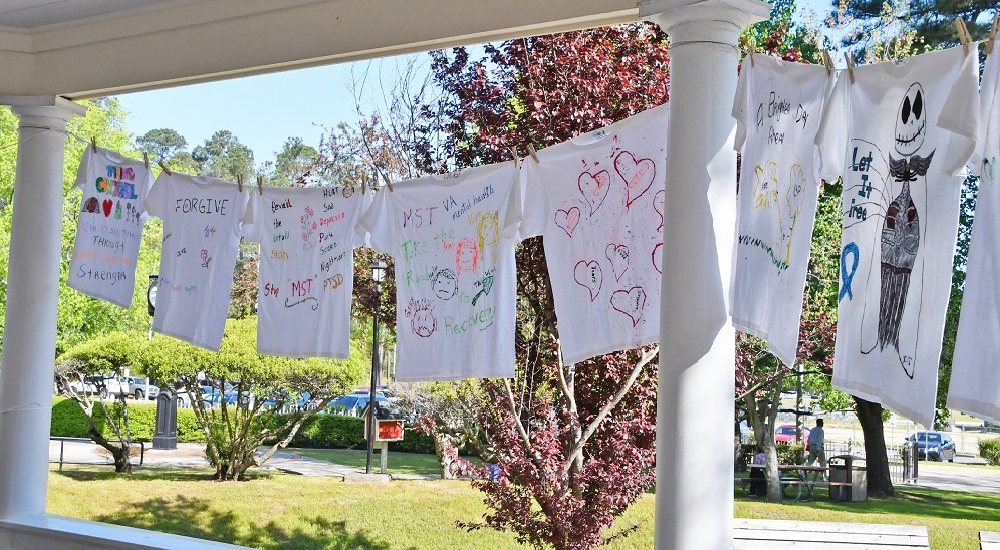Pictured above: Tee shirts created by military sexual trauma survivors hang on the line at Fayetteville VAMC.
In observance of Sexual Assault Awareness Month, rows of tee shirts hung from clotheslines at the Fayetteville VA Medical Center in North Carolina. The shirts were created as part of the Clothesline Project by survivors of military sexual trauma or MST—sexual assault or harassment experienced during military service. Among Veterans in the VA health care system, one in four women and one in 100 men report having experienced MST.
Army Veteran Heather Hennessey, an MST survivor, today helps other survivors as a peer specialist in the women’s behavioral health integration and MST programs at the Fayetteville VA.
“I went through the VA MST program in 2013 and it was a life-changing experience for me,” said Hennessey. “For so long, I thought that I was the only one dealing with sexual trauma and having so many issues in my professional and personal life. Going through the program helped me understand that I could begin to heal from my trauma and work on the ‘stuck points’ that kept me depressed and full of anxiety.”
As a peer specialist, Hennessey works with Veterans in groups and individually, helping them create recovery plans, develop resiliency and learn coping skills such as anger management and building trust. “I believe that I am a role model for recovery from MST and it is my job to encourage these Veterans to continue to progress in their own recovery process,” she said. “I know how difficult it is to get through this type of treatment.”
Hennessey noted that all Veterans are eligible for MST-related care in VA and that such care is 100 percent covered. “Veterans who have no service connection, and even those with other-than-honorable discharges, can receive MST-related care,” she said.
It’s especially tough for men to deal with or even acknowledge MST, observed Hennessey. “I have discovered that even when VA providers ask male Veterans if they have experienced MST, they often say no, even when it has happened to them,” she said. The most common story she hears is from older Veterans “who have waited decades to come in to get MST treatment. These Veterans were suffering in silence for all those years because they did not know that recovery is possible.”
Hennessey said that most of the Veterans who created tee shirts for the Clothesline Project display told her they felt empowered. “I also think that the shirts bring an awareness to VA providers to continue to ask Veterans if they have experienced MST so that they can get the treatment they need to move on with their lives,” she said.
Shared her story at annual run
Hennessey advocates for MST awareness outside VA as well. She was a guest speaker at the annual Sexual Assault Awareness Run at Fort Bragg, North Carolina. “I shared my story of recovery to over 400 active-duty soldiers and let them know that MST is still happening within their ranks and they do not have to wait until they discharge from the military to get help,” she said. “I also let them know that when they discharge, VA is there to help them as well.”
Hennessey’s message to Veterans and service members is: “Don’t wait another day, week or year to get the treatment you need to live your best life. We are here to help. You are not alone.”
Information on VA’s MST resources can be found here. Active service members can go to the Safe Helpline website, a crisis support service for members of the Department of Defense community affected by sexual assault.
The Clothesline Project was founded in 1990 in Cape Cod, Mass., to address the issue of violence against women. The Clothesline is made up of tee shirts created by survivors of violence or in honor of someone who has experienced violence. The project began with 31 shirts and has grown into a worldwide movement.

All photos by: Brad Garner, Fayetteville VA Medical Center
Topics in this story
More Stories
The Medical Foster Home program offers Veterans an alternative to nursing homes.
Watch the Under Secretary for Health and a panel of experts discuss VA Health Connect tele-emergency care.
The 2024 National Veteran Suicide Prevention Annual Report provides the foundation for VA’s suicide prevention programs and initiatives.








I am med boarding due to ptsd mainly from my mst twice so seeing stuff like this helps thank you so much ..